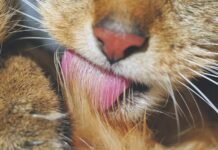Weve all experienced waking up to the feeling of a wet nose and whiskers brushing against our faces, accompanied by the pleasant odor of tuna cat food. Okay, so maybe our favorite feline friends dont always have minty fresh breath.
As James R. Richards, DVM, director of the Cornell Feline Health Center points out, Cat breath doesnt have a fragrance that youre likely to dab behind your ear. But in some cases, bad breath can indicate a far more serious problem than a simple case of herring halitosis.
Indicator of a Health Problem
If your cats breath is just plain bad, theres probably something else going on. The problem may reside in the cats mouth specifically, such as a case of gingivitis, periodontal disease or oral cancer.
Gingivitis is inflammation of the gums (gingiva) caused by the combination of bacteria, plaque, and tartar. It can be reversed with cleaning and plaque control, however. If gingivitis is left untreated, pockets of pus may accumulate in the gum line and separate the tooth from the gum and bone. As in humans, this condition, called periodontal disease, is not reversible – but it can be kept in check with plaque control and cleaning. Besides bad breath, the accompanying signs include swollen, tender gums and a yellowish-brown crust at the gum line. There is also a chance of tooth loss.
If your cat does have advanced oral disease, shell need to undergo a thorough tooth cleaning and other procedures at the veterinarians office, which will require that she be anesthetized.
Another possibility for the underlying cause of chronic bad breath is a mouth tumor, which is more common in older cats. Bad smells from the mouth can also be indicative of problems elsewhere in the cats body. An ammonia-like breath may be a sign of kidney failure, for example. (It is caused by the buildup of waste products in the body, since the kidneys are no longer functioning properly.)
You can prevent gum disease, tooth loss and threat of infection by brushing your cats teeth with a toothbrush and specially-formulated toothpaste for cats. Make sure that your cat receives an oral checkup whenever you take her to the veterinarian – your cats veterinarian is also her dentist.
Diet can be a contributing factor, as well. Veterinarians believe that dry, crunchy food is somewhat better at keeping mouth and tooth problems at bay, so a portion of her daily food intake should be of the crunchy variety.
Pay Attention to Signs
What if youre unsure of the difference between normal stinky and abnormal stinky breath? Dr. Richards suggests that you make sure you sniff your cats breath when shes healthy to get a baseline. Also, keep on the lookout for other signs, such as pain or discomfort, a difference in your cats eating or chewing habits, pawing at the face, lethargy and depression. You should take your cat to the veterinarian if you notice any of these signs.



